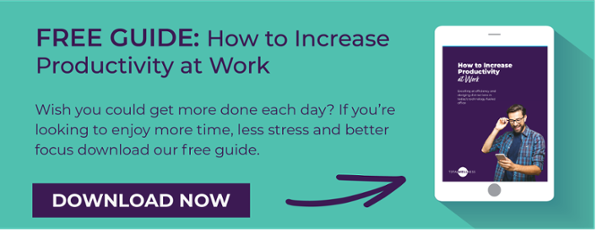Workplace distractions.
These pesky diversions in the workplace can prevent productive workflows and even create unhealthy behaviors in some cases. From cell phone usage to clutter and gossip to last-minute meetings, distractions galore exist if you let them. Without a doubt, these distractions lead to productivity loss, and, in some cases, poor health.
Luckily, there are plenty of ways to avoid or manage distractions that cost you time and energy.
Below, we cover the top unhealthy distractions and how employers can help workers avoid these time-sucking traps.
The Unhealthy Workplace Distractions to Stop Today
In the workplace, it’s easy for distractions to take over. Whether it’s a pinging sound from the team communication platform or cell phone notifications or other interferences, there is no denying the constant barrage of distractions isn’t good for mental health or work productivity.
An awareness of the most time-sucking habits is the key to making changes that are healthy and productive. One way to do this is by keeping a log of activities over the course of a few days and notating what distractions popped up the most. Aside from logging distractions, be sure to record the time it took to get back on track. The results may surprise you.
Not sure what the biggest distracting offenders are? Here’s a look at the most common distractions:
1. Too Much Multitasking
As much as people would like to think they can multitask and it’s not a distraction, research proves otherwise. In fact, one study found that only about 2.5 percent of people can actually multitask! Our brains are limited in how they can pay attention to various tasks and activities. Essentially, rapidly switching between tasks is what our brains and bodies do when we multitask and isn’t the best way to get productive work done.
Tip: Create a to-do list set by priority. Follow it throughout the day and check off items as they are completed. Larger projects may need to be broken down into steps, require colleague attention, etc. Write it all down so steps don’t get missed and there’s a distinct outline to focus on.
RELATED: What’s the Secret to Productivity? (Hint: You Know the Answer)
2. Keeping the Clutter
Not only does physical clutter clog up workspaces, but it also takes up the mental space in employees’ minds. Whether you’re dealing with a messy desktop, bursting filing cabinets, or other clutter, your brain doesn’t like it. In fact, ongoing disorganization has a negative impact on our brains as it can decrease our memory. In 2011, neuroscience researchers using fMRI (functional magnetic resonance imaging) foundclearing clutter from the home and work environment increased focus and the ability to process information. It also resulted in increased productivity.
Tip: At the end of each work day, toss or recycle items atop your desk. Keeping your desk alone organized can make all the difference in starting your work day productively and in a better state of mind.
RELATED: Cut the Clutter: The Benefits of Minimalism Employees Will Love
3. Leaning into Gossip
While gossip may be seen as “socializing” in office spaces, it actually takes time away from productive work and is toxic. At its worst, gossip is a way to undermine others and can be malicious and destroy careers. Fake news and rumors have a negative impact on the mind as well as the body. Ever come across a depressing news story and found after reading it your mood dipped? Those feelings can stick in your head even after finding out the news is false. Whether actual news or company news, think about how what you share or speak about can impact your mind and others — especially if it’s false. Additionally, gossip may lead to bullying and can cause issues like depression, anxiety, and even exhaustion for those experiencing it.
Tip: If someone starts gossiping, simply say, “I’m not comfortable discussing this” or even cut it off by saying “I’ve got to get back to work.” Doing so protects your mental headspace.
4. Clinging to Cell Phones
There’s a reason there are laws in many states for not using your phone while driving — it’s a distraction that can kill you. While not as severe consequences exist in the workplace for using your phone, it can still create an unhealthy habit that serves as a distraction. If you’re using your phone excessively throughout the day, it may be time to take a break. One study found that simply reducing usage by an hour daily can improve mental health.
Nearly 50% of people say they are addicted to their phones. The constant need to check phones can lead to unhealthy social media and screen habits. Not to mention, it can cause issues like headaches, eye strain, and back and shoulder pain, research finds.
Tip: On your next break, consider reading a book or magazine. Better yet, converse with another person instead of scrolling through your phone. Reading is excellent for memory and knowledge expansion while social connection is essential for good mental health.
5. Attending Unnecessary Meetings
One study found the average worker attends 62 meetings monthly. How many of those hours could have been used for actual work? Sometimes, meetings are a necessary part of the workplace. But meetings for the sake of meetings aren’t productive as having too many can take away valuable work time and also increase sedentary time on the job as well.
Tip: Get buy-in from whoever you need to have a meeting with and ensure there is an agenda and a firm start and stop time for the meeting. Doing so protects everyone’s time and energy.
6. Falling Down the Social Media Hole
If there’s one way to waste time at work, it’s spending time on social media. There’s a reason it’s called the “scroll hole.” Using social media too much not only disrupts workflow and thought processes but is also known to cause issues like anxiety and depression. According to an article published on McLean Hospital’s website, health issues can stem beyond mental health concerns: “Researchers know the connection between the mind and the gut can turn anxiety and depression into nausea, headaches, muscle tension, and tremors.”
Tip: Turn off notifications and consider page blockers to keep social media sites from distracting you — and potentially stressing you — during the work day.
7. Requesting Always-Open Communication Platforms
The average employee encounters nearly 60 interruptions daily, according to a study by Atlassian. For remote and hybrid workers, it may not be an option to completely shut down team communication platforms. Slack channels and other messaging systems are a great way to stay connected with teammates across the globe. But it can also trigger anxiety for those who are constantly logged in and hearing dings or pop-up notifications. If a worker feels they have to respond to every message that comes in, it’s nearly impossible to hit a good work stride.
Tip: Set aside specific times to respond to emails, messages, and the like. Perhaps once in the morning and once in the afternoon to avoid staying in constant communication and never working on any other work tasks.
How to Help Employees With Workplace Distractions
In a workplace, there are always opportunities for interruptions. But it certainly depends on your company’s work culture, policies, and general atmosphere how often and long these disruptions are tolerated for.
Encourage Time Blocks
Time is precious and we all have the same amount of time. It’s the way we use it that matters and discipline propels us forward in our projects and activities. Share with employees the concept of time blocking to work on specific projects. You may also encourage the use of timers during these intense work periods to remind them to get up and stretch, too!
Get Organized
For open concept companies, it’s especially important to stay organized. You don’t want customers seeing a bunch of clutter upon walking into your building. Encourage workers to clean up at the end of the day. Purchase any organizational tools like filing cabinets, folders, etc. to help them keep their spaces organized.
Remind Workers of Policies
Some companies have strict rules such as “no gossip” policies and the like. If issues like gossip or office drama are getting out of hand, send out a reminder of the company handbook and rules via email. Tell employees to reach out if they have any questions.
Ensure Meetings Are Full Circle
Endless meetings do no one any favors. Make sure they don’t become another workplace distraction but instead offer useful information and action. At the end of each meeting, have a quick recap with the next steps each person needs to take. Have a point of contact for those individuals to reach out to with any questions if needed prior to the next meeting.
Hit Refresh on Response Expectations
Remind workers they should respond to clients and colleagues in a timely manner, but that doesn’t mean ASAP. Checking email once or twice daily should suffice. Same with communication channels unless there is a major project deadline looming. Communicate expectations for connecting often to keep everyone on the same page.
Don’t Let Distractions Detract From Workplace Goals
Becoming aware of distractions is only part of the solution. It’s making changes and tackling bad habits that can make all the difference.
Not only will looking at the above workplace distractions create intentional conversations about productivity, it will also help workers realize how some habits may have become increasingly unhealthy like repeatedly checking social media.
When workers better understand their weak spots, they can make positive changes. The results will have them no doubt feeling more fulfilled, productive, and happy with how their work days play out when they eliminate unnecessary distractions.
What are some of your hacks for eliminating workplace distractions? Share your thoughts below!











